Exporter Spotlight Series

Access Trax Makes Its Way to 14 Countries—One High Density Polyethylene Mat in Front of the Other
This Social Impact Entrepreneur Battles Supply Chain Issues, Inflation and Other Unexpected Expenses and Still Comes Out Swinging
What a difference inflation makes. Not to mention delays in the supply chain.
When Kelly Twichel’s delivery lead-time to her Access Trax customers skyrocketed last year, she had to think fast. Receiving times for materials to manufacture her portable accessibility mats went from six weeks to six months overnight, and her resulting lack of inventory led to unfilled orders, unavailability of product and costs that exceeded the prices she had offered customers months ago.
Then, there was the cost inflation for those materials. How do you tell customers that product they ordered two months ago already had a significant price hike to accommodate the increase in cost of goods? The short answer is you can’t.
Add to that rising shipping costs, export fees and ships held up in various ports and well, you get the picture. It would have been a daunting scenario for any business, but for a small business with $170K in annual revenue, it was a perfect storm. Yet for 31-year-old Kelly, who had formally only launched her business in 2018, it was a storm she was determined to weather.
Order materials way further in advance; order slightly less materials for shorter projections to incorporate their corresponding updated material costs to pass on to customers; calculate export document costs into the pricing; and tap every resource available, including federal government support of export efforts with reimbursed dollars. Kelly came out swinging and it made a big impact. All in all, only two customers cancelled orders because of the delay, and Kelly never looked back.
Hard Lessons to Learn When You’re 12 Can Shape You in the Best Ways
It was nothing new for this newly anointed social impact entrepreneur to overcome adversity. Her mother’s debilitating stroke when Kelly was just 12-years-old threw her into a world of rehabilitative therapy and a realization that society is not built for people with disabilities.
“One moment my dad was knocking on my door during a sleepover with my friends telling me my mom was on the bathroom floor not moving,” she recalls, “and the moments that followed changed my life. I was exposed to disability at a younger age than others. It really shaped me. It was why I got my degree in Occupational Therapy. I believe every one of us has had a transformative event in our lives that can actually be our superpower…it makes us better equipped to tackle challenges like starting a business.”
Kelly’s past is also why she accepted the challenge laid before her by her Assistive Technologies professor at the University of St. Augustine for Health Sciences in San Marcos, California, back in 2016. The professor, who was a surfer herself, asked students to help surfers with disabilities cross the sand in their wheelchairs so they can access the ocean with ease. Kelly and her study partner Eric Packard (now a silent partner in Access Trax) gladly accepted the task.
Her product tests with local adaptive surfers and during the coincidental timing of the World Adaptive Surfing Championships in San Diego that same year introduced her to many disabled surfers. One surfer said he resorted to dragging his body across the sand to get to the water so he could carve the waves with a paddle in his kayak-like board (waveski). This highlighted the need for a product like Access Trax in the market to promote independence and dignity in accessing the beach and other outdoor areas.
Simple Logistics Become a Little Trickier Than at First Glance
That was the day Kelly’s school project turned into a vision to give millions of people new access to the joy of the outdoors, whether they needed to cross pebble driveways, grassy parks, snowy pavement or sandy beaches. The grant money she won from her school’s global business competition helped her to begin prototyping to evolve the product from aluminum rain gutters tied to mesh mats during her first testing on the beach to what have become mats made of high-density polyethylene.
Kelly’s logistics are actually quite simple. She works out of her home to keep overhead low, sources goods mainly in the United States and drop-ships the final product to customers out of San Diego after manufacturing them primarily with ePlastics and MGM Plastics and finishing them herself. She sells direct from her website to consumers, businesses (resorts, hotels, event planners, etc.) and government entities mandated to accommodate visitors with disabilities. She generates her own quotes, packages products in her garage and ships them out via FedEx.
Access Trax’s business procedures are so simplified, in fact, that Kelly calls her move into exporting “Accidental Export,” under the caveat “Timing is everything.” What were the chances that the very first World Adaptive Surfing Championships would be held in San Diego to coincide with Kelly’s testing of her college class prototype the very next year in 2016?
Adaptive surfers from countries all over the world, including South Africa, Germany, Mexico, Canada and Japan, kept in touch with Kelly over the years until her formal launch less than two years later. So it was no surprise that one of them—the Japan Adaptive Surfing Organization—was the first foreign non-profit organization to order from Access Trax. Today, the company boasts a worldwide customer base of 14 countries, which account for 7 percent of what Kelly projects will be $250K in revenue for 2022.
“I had to figure out how to translate all our written materials into Japanese,” she says of that first order, “figure out the exchange rate and what documentation I needed to export. I didn’t know what I didn’t know about exporting so I sought out resources for mentorship early on. I knew if I didn’t find some guidance, I could make a financial mistake that could cost my company everything.”
Be Smart Enough to Know You Don’t Know What You Don’t Know
This need for resources led Kelly to the San Diego-based World Trade Center’s MetroConnect program in 2021—with the goal of accommodating her then-largest export client whose government project was a remodel for the FIFA World Cup in Doha, Qatar. Thanks in part to her investment in updating the Access Trax website to optimize SEO and post regular blogs, the Doha contractor had actually found and called out Access Trax products in its proposal to make two beaches all-accessible. “I still had to learn a lot to service this client,” notes Kelly. “I’m a woman-owned business dealing with Middle Eastern cultural differences. I had a photo of me in my shorts and T-shirt on my website and in my product specifications and production instruction manuals. That all had to be changed.”
In addition to editing her appearance to be “more culturally competent” with the Middle East, Kelly also had to work with consultants at the World Trade Center to get her documents certified by the U.S. Arab Chamber of Commerce and notary-stamped. She had the surprise of paying those certification fees, plus a percentage of the commercial invoice—an $800.00 unplanned bill. “It was a learning experience,” she notes, “and I got a lot of help so I know better for next time. I hadn’t ever used a pallet for ocean cargo, only boxes, so that was a big lesson in itself.”
It’s a set of lessons Kelly wants to learn more about, and the reason for her access of a State Trade Expansion Program (STEP) grant that reimbursed her for up to 75 percent of her export activity spend up to a maximum of $10K. Her involvement in the MetroConnect program also helped her set goals of 25-30 percent in exports for fiscal year 2022-2023.
“Exporting is complicated and rewarding at the same time,” says Kelly, who hired her first official part-time employee last year—her husband Jeffrey Bruder, who was once a rescue swimmer in the Navy and now surfs, too. “The federal government has amazing resources to help you. And exporting makes you more recession-proof and more profitable. It’s never a bad idea.”
There’s a Lot More Land to Cross For This Fledgling Company
Perhaps Australia will be her next big export destination, since Kelly used some of her STEP funds to commission the U.S. Commercial Service to conduct an initial market check there for potential partners who may be interested in her product. As a result, she has a report with contacts to whom she can reach out when she’s ready.
“These kinds of studies, together with the exposure of our website, have people from all over the world finding Access Trax for so many uses beyond the beach,” she says, “and a part of that is learning how to do business in a new country. It’s challenging, but how can I say no when we sell a life-changing product? I may only be 31-years-old, but this business has already aged me a lot. I still have a lot of good impact left to make.”
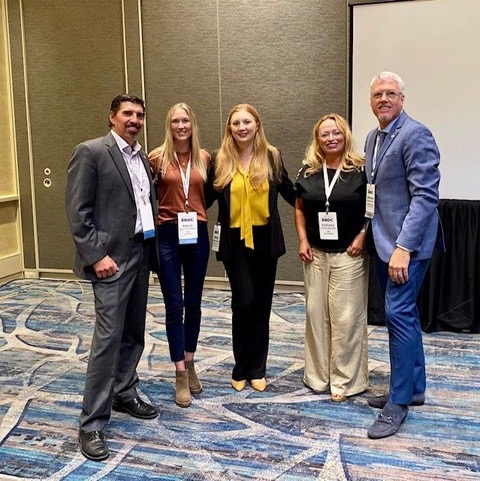
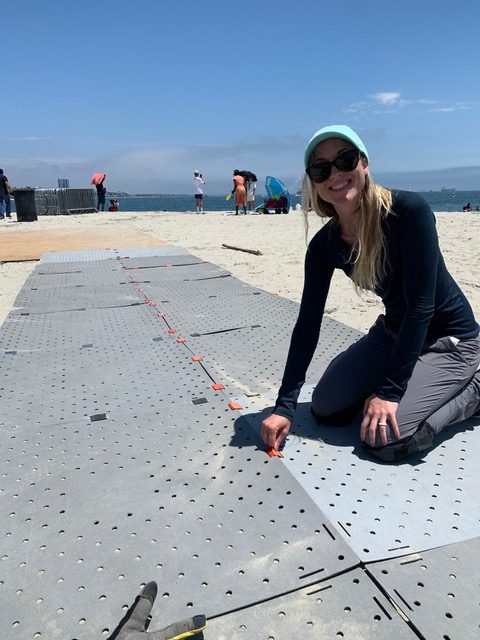
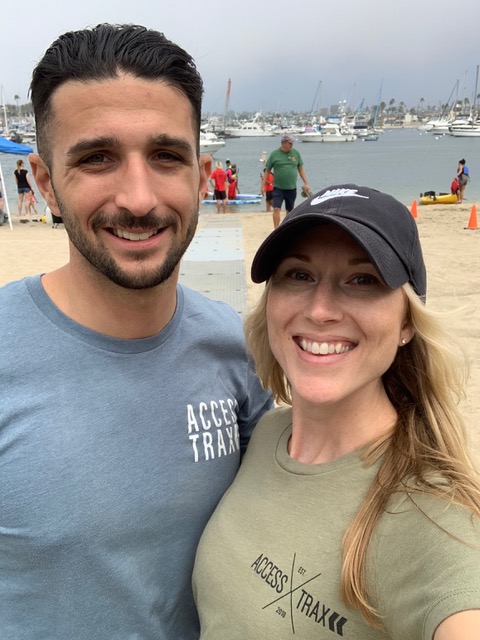
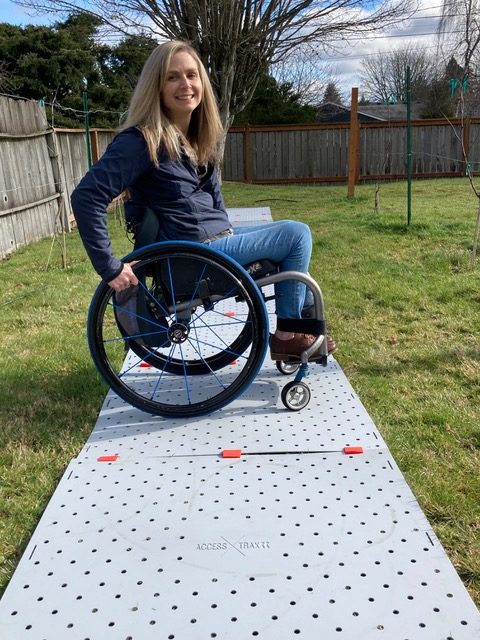
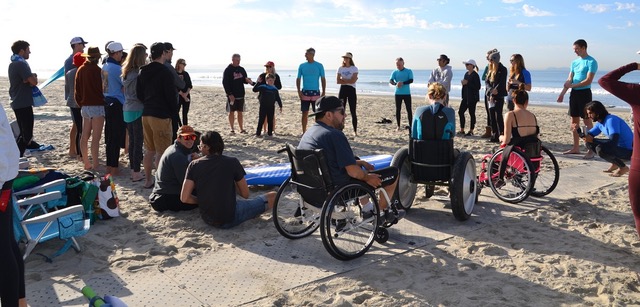
–
Resources that helped Access Trax with their export journey:
- World Trade Center (WTC)—specifically through the WTC San Diego’s flagship program, MetroConnect (Kelly is in their current cohort)
- State Trade Expansion Program
- Small Business Development Center
- U.S. Commercial Service
- FedEx
- The Ahlers Center for International Business (at University of San Diego): Global Readiness Program and Global Market Navigator Program
